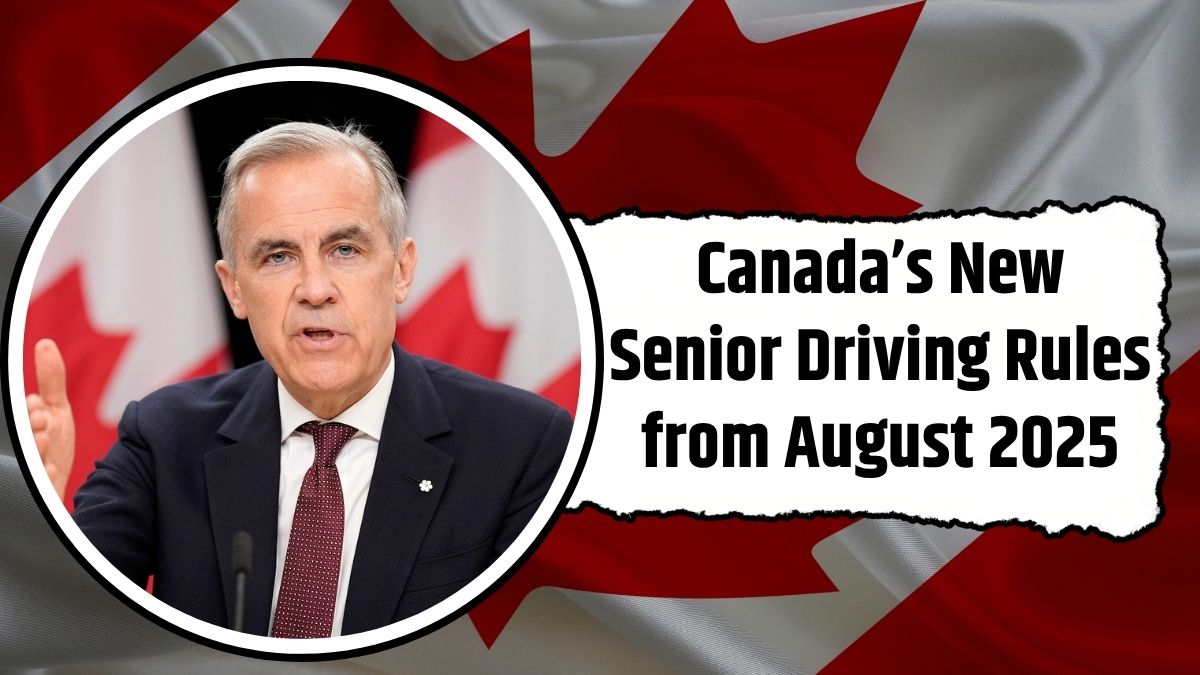Starting August 2025, new age-based driving rules in Canada will come into effect for senior citizens. These regulations impact Canadians aged 65 and above, bringing a series of structured changes in testing procedures, medical evaluations, and license renewal intervals. The primary aim is to boost road safety while helping seniors maintain their driving independence.
With a growing focus on senior mobility and public safety, the government is introducing these reforms to create a more standardized and fair license renewal system. Let’s explore who will be affected, what the updated rules involve, and how senior drivers should prepare for renewal under this new framework.
Why New Age-Based Driving Rules Are Being Enforced
The rollout of the senior driving license renewal August 2025 rules stems from demographic shifts. Canada’s population of individuals aged 65 and older is rapidly increasing. As people age, the risk of health issues that may affect driving ability—such as poor eyesight, slower reflexes, or chronic conditions—also rises.
To address this, the new age-based rule Canada enforces a consistent framework for assessing older drivers. It sets clear medical and vision testing standards, helping authorities identify drivers who are fit to stay on the road while reducing accident risks from those who may no longer be safe behind the wheel.
New Requirements for Senior Driving License Renewal
The updated program introduces several critical changes in the renewal process. These adjustments are based on age brackets, with increasing requirements for older drivers. Here’s a summary of the age-specific changes coming into effect in August 2025:
- Ages 65–69: Standard renewal process remains unchanged.
- Ages 70–74: Mandatory medical report required.
- Ages 75–79: Must complete both in-person vision testing and provide a medical report.
- Ages 80–84: License renewal now required every two years instead of five.
- Age 85 and above: Involves group education sessions and a written knowledge test.
Additionally, a road test may be requested at any age if concerns are raised by a doctor, family member, or licensing authority.
These changes align with the age-based rule Canada initiative, which emphasizes assessing a senior’s actual driving capacity rather than making assumptions based on age alone.
What Seniors Should Prepare Before Renewal
To ensure a smooth experience with the senior driving license renewal August 2025, older Canadians are advised to begin preparations at least two months before their renewal date. Here’s a practical checklist:
- Book your medical examination early, especially if appointments take time to schedule.
- Update your vision prescription and visit an optometrist for a check-up.
- Study the driver’s handbook, especially if you are aged 85 or older and preparing for a knowledge test.
- Register early for group education sessions, where applicable.
- Ensure your address and contact information are updated with your provincial licensing authority.
Being proactive about these steps is essential, as the age-based rule Canada requires multiple documents and may involve additional procedures based on age and health.
How the New Rules Affect Road Safety and Independence
Some older drivers may view the senior driving license renewal August 2025 rules as burdensome. However, the government insists the goal is balance—protecting public safety without unfairly limiting the autonomy of capable drivers.
The tiered evaluation system allows authorities to detect potential health issues early, which may also benefit seniors outside of driving. For example, vision impairments or cognitive concerns identified through the renewal process can lead to early medical intervention.
Moreover, for seniors who choose or are required to stop driving, provinces are enhancing support systems. These include accessible public transportation options, senior ride-sharing services, and subsidized taxi programs, ensuring that mobility is not entirely lost.
Summary Table: New Age-Based License Renewal Rules
| Age Group | New Requirements (Effective August 2025) |
|---|---|
| 65–69 | No change – standard renewal |
| 70–74 | Mandatory medical report |
| 75–79 | Vision test and medical report |
| 80–84 | Renewal every 2 years |
| 85+ | Group education and knowledge test |
This age-tiered approach reflects the Canadian government’s commitment to evidence-based safety measures rather than ageist assumptions.
Frequently Asked Questions (FAQs)
Q1. What is the new rule for senior driving license renewal in August 2025?
Starting in August 2025, seniors over 70 must undergo medical reviews, and additional testing increases at 75, 80, and 85 years of age.
Q2. What does the age-based rule Canada involve?
The rule introduces tiered renewal steps including medical check-ups, vision testing, knowledge exams, and educational sessions as drivers age.
Q3. How often do seniors need to renew their licenses now?
Seniors aged 80 and above must renew their license every two years, replacing the previous five-year cycle.
Q4. Are road tests mandatory for all seniors?
No. Road tests are only required if flagged by medical professionals, family members, or the licensing body due to safety concerns.
Q5. Can seniors prepare for these new requirements in advance?
Absolutely. Seniors should schedule medical and vision appointments early and review updated provincial driver guides to avoid delays.
